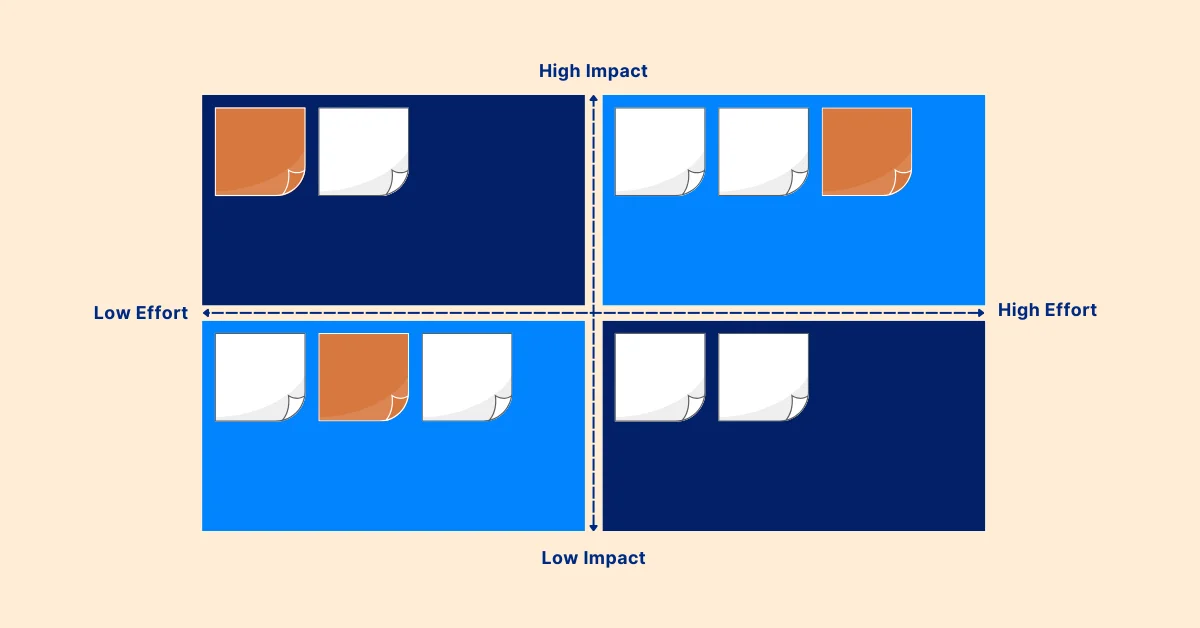What Does a Technical Project Manager Do?
Discover the critical role of a technical project manager in driving successful tech projects with this insightful guide.
A technical project manager plays a vital role in guiding complex technology projects to success. Unlike other project managers, they blend deep technical knowledge with project management skills to lead teams in fields like software development, IT infrastructure, or data science. This blog dives into what a technical project manager does, their skills, challenges, and why they’re essential in tech-driven industries. We’ll also compare them to other project managers in general and explore how tools like TaskFord support their work.
What Is a Technical Project Manager?
A technical project manager oversees projects with significant technical components, such as building software, upgrading IT systems, or launching data-driven solutions. They act as a bridge between technical teams (like developers or engineers) and non-technical stakeholders (like clients or executives). Their job is to ensure projects finish on time, stay within budget, and meet technical and business goals.
What sets them apart from other types of project managers is their ability to understand the technology behind the project. For example, in a software project, they might know coding languages like Python, understand system architecture, or be familiar with cloud platforms like AWS. This expertise helps them make smart decisions and communicate clearly with everyone involved.
Key Responsibilities of a Technical Project Manager
Technical project managers wear many hats, balancing technical oversight with leadership and organization. Here’s what they typically do:
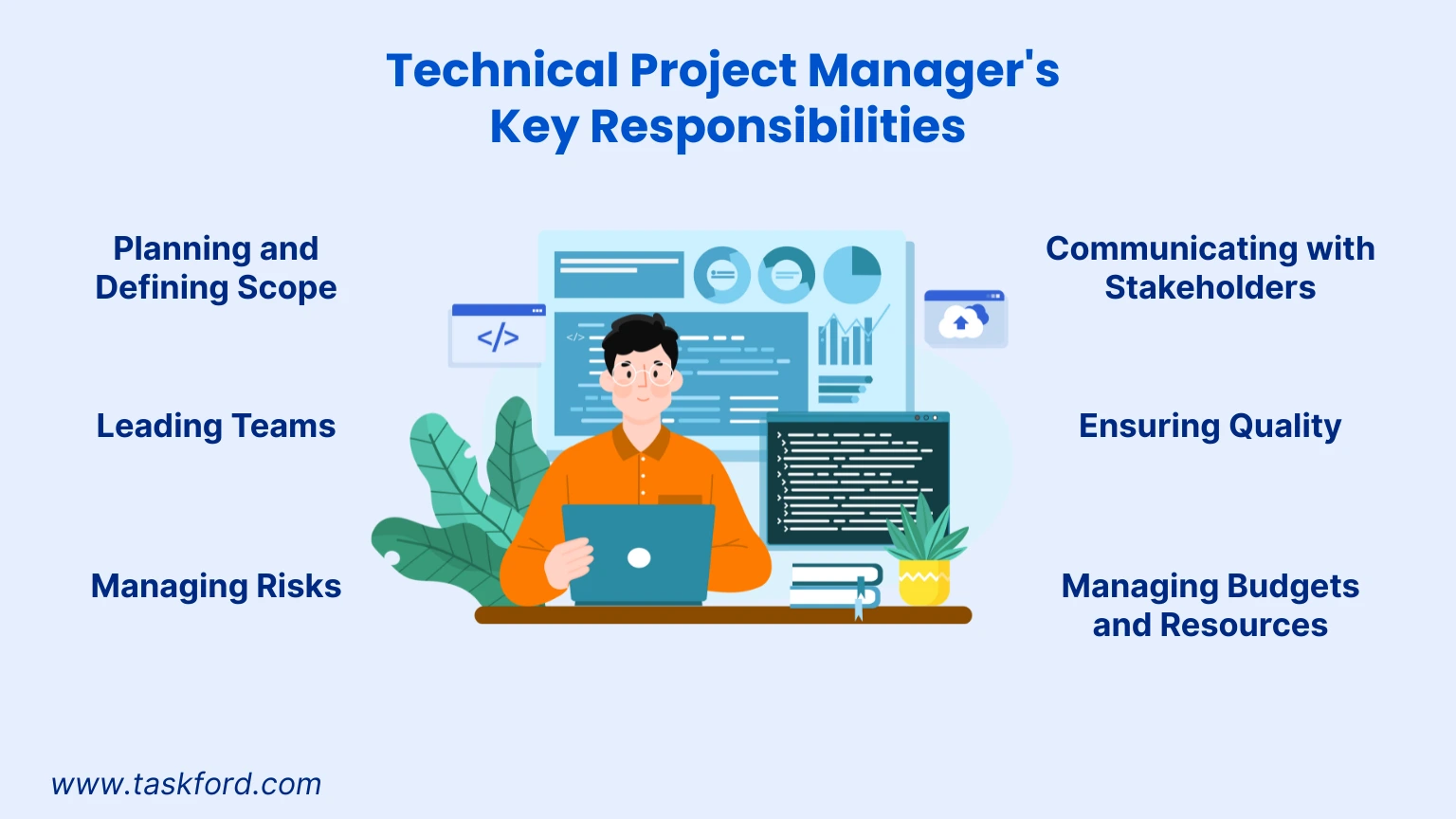
-
Planning and Defining Scope: They start by mapping out the project’s goals, deliverables, and timeline. This involves working with stakeholders to understand technical needs and creating a clear plan. For instance, in an IT project, they might decide what hardware or software is required and identify potential risks, like system compatibility issues.
-
Leading Teams: They guide cross-functional teams, including developers, engineers, and designers. By assigning tasks and encouraging collaboration, they keep everyone focused. Clear communication helps resolve conflicts and keeps the project on track.
-
Managing Risks: Technical projects can hit roadblocks, like software bugs or delayed hardware deliveries. Technical project managers spot these risks early and create backup plans. For example, if a new app doesn’t work with older systems, they might suggest a workaround or adjust the timeline for extra testing.
-
Ensuring Quality: With their technical know-how, they check that deliverables meet standards. This could mean reviewing code, testing software, or confirming that a new server setup follows industry best practices. Their attention to detail catches issues others might miss.
-
Communicating with Stakeholders: They translate complex technical details into simple updates for clients or executives. Regular reports, like progress updates or budget summaries, keep everyone informed and aligned.
-
Managing Budgets and Resources: They allocate resources wisely to stay within budget. This might involve negotiating with vendors for software licenses or balancing cost with performance needs for a cloud-based project.
(Learn more: Understanding Resource Allocation)
Essential Skills a Technical Project Manager Should Have
To succeed, technical project managers need a mix of technical and people skills. Here are the key ones:
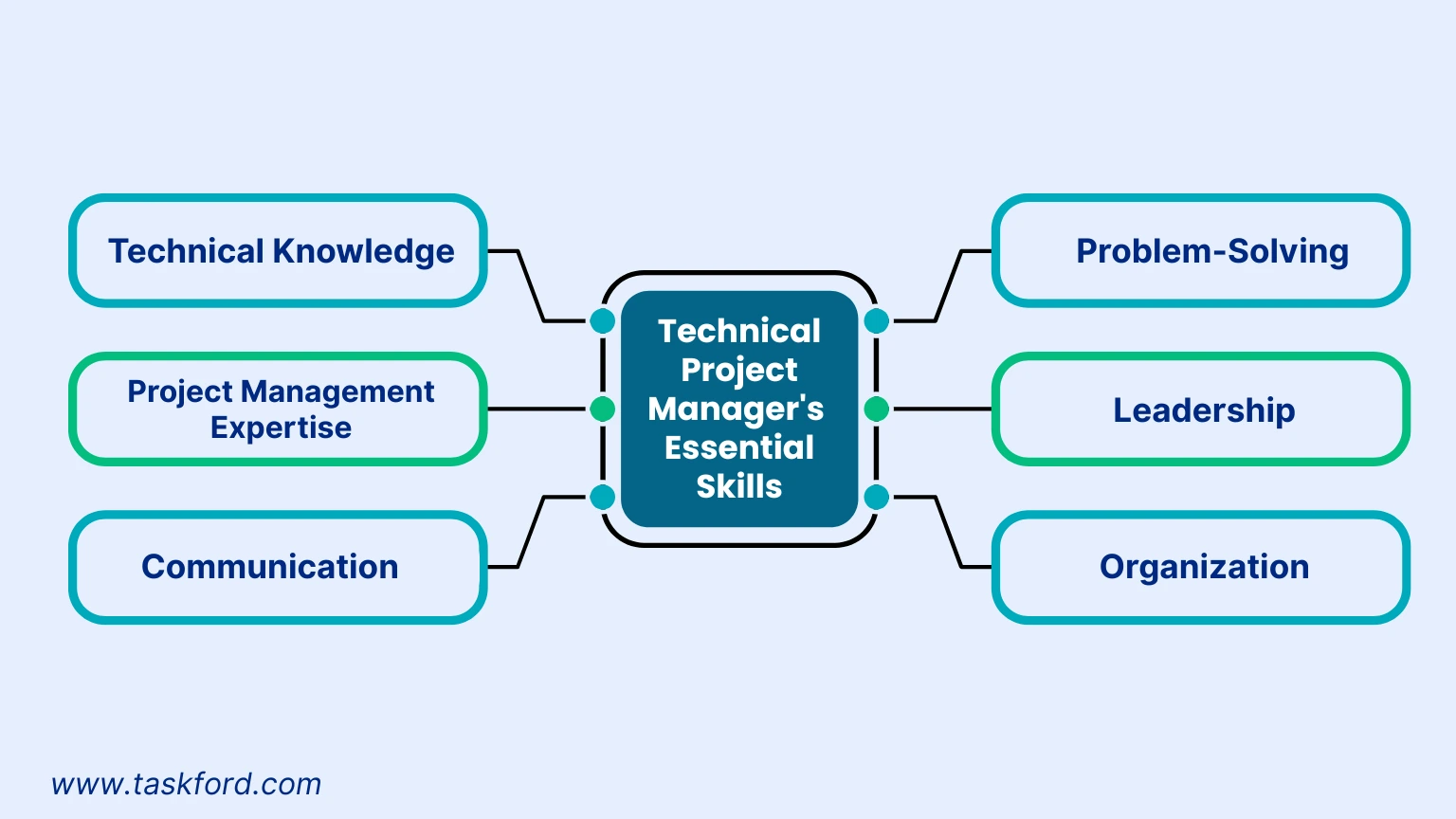
- Technical Knowledge: Understanding tools, coding languages, or platforms like Azure or Git is crucial for guiding technical teams.
- Project Management Expertise: Familiarity with methods like Agile Project Management or Scrum helps them manage projects effectively, especially in fast-paced tech environments.
- Communication: They explain technical issues to non-technical people and discuss detailed requirements with developers.
- Problem-Solving: When issues like system crashes arise, they think fast to find solutions.
- Leadership: They motivate teams, resolve conflicts, and foster a positive work environment.
- Organization: Managing timelines, budgets, and resources requires strong planning skills.
Technical Project Manager vs Other Project Managers
Project management is a broad field with many roles, but technical project managers stand out due to their focus on technology-driven projects. Other types project managers, in general, handle a wide range of projects across various industries, often without needing deep technical expertise. The table below compares technical project managers to other project managers as a broad category to highlight key differences:
| Aspect | Technical Project Manager | Other Project Managers |
|---|---|---|
| Primary Focus | Managing projects with significant technical components, like software or IT systems | Managing diverse projects, often focused on timelines, budgets, and deliverables |
| Technical Expertise | High; requires knowledge of tools, coding, or systems (e.g., Python, AWS, system architecture) | Low to moderate; technical knowledge varies, often not required |
| Key Responsibilities | Plan technical projects, ensure quality, manage technical risks, lead cross-functional teams | Plan projects, manage budgets and schedules, coordinate teams, focus on general delivery |
| Industries | Tech-heavy fields like software development, IT, data science, engineering | Broad range, including construction, marketing, events, or business operations |
| Challenges | Balancing technical and management tasks, keeping up with fast-evolving technology | Managing stakeholder expectations, resource constraints, and team coordination |
Technical project managers are unique because they dive into technical details, like troubleshooting code or validating system performance, while also handling traditional project management tasks like budgeting and stakeholder communication.
Other project managers, in general, focus more on high-level oversight, such as meeting deadlines or managing resources, without needing to understand complex technical systems. For example, a technical project manager might resolve a software integration issue, while another project manager might focus on coordinating a marketing campaign’s timeline. This technical focus makes them essential for projects where technology is central to success.
Challenges a Technical Project Manager Faces
The role isn’t easy. Here are some common challenges:
- Balancing Roles: Juggling technical tasks (like troubleshooting a system) with management duties (like reporting to stakeholders) can be tough.
- Managing Expectations: Non-technical stakeholders might expect quick results without understanding technical limits. Technical project managers must explain constraints clearly.
- Staying Current: Technology changes fast. They need to keep up with new tools, like updates to cloud platforms or programming frameworks.
- Team Dynamics: Technical teams often have strong personalities. Managing conflicts and keeping morale high takes skill.
- Handling Complex Risks: Technical projects rely on things like third-party software or hardware, which can cause delays or failures. They must plan for these risks.
Why a Technical Project Manager is so Important
Technical project managers are critical to the success of tech-driven projects, acting as the linchpin that ensures complex initiatives meet both technical and business objectives. Their unique ability to navigate technical challenges while aligning with organizational goals makes them indispensable in industries where technology drives innovation. Below, we break down why technical project managers are so vital:
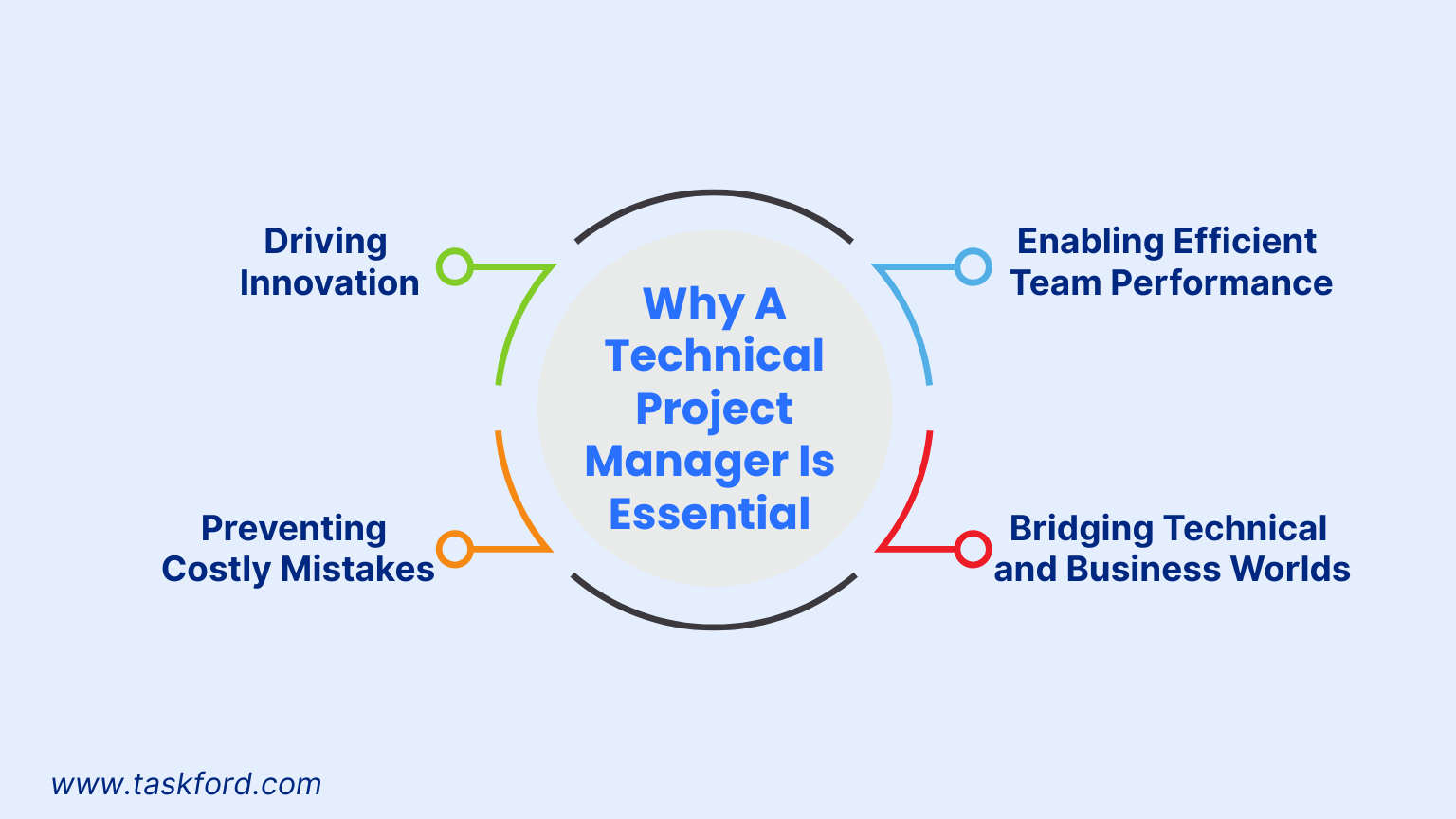
1. Bridging Technical and Business Worlds
Technical project managers excel at connecting technical teams with non-technical stakeholders, ensuring everyone is on the same page. This is crucial for project success in tech-heavy environments.
- Clear Communication: They translate complex technical concepts, like API integration challenges, into simple terms for executives or clients, reducing misunderstandings.
- Stakeholder Alignment: By keeping business goals in focus, they ensure technical work delivers value, such as launching a user-friendly app that boosts customer engagement.
For example, in a cloud migration project, a technical project manager might explain to stakeholders why additional testing is needed to ensure data security, aligning technical needs with business priorities.
2. Driving Innovation Through Technical Expertise
Their deep understanding of technology allows them to guide teams in creating cutting-edge solutions, pushing innovation forward.
- Guiding Technical Execution: They ensure technical deliverables, like a machine learning algorithm, meet performance standards while staying within project constraints.
- Problem-Solving Complex Issues: When technical hurdles arise, such as software compatibility problems, they propose solutions like adopting middleware, keeping projects on track.
For instance, in a data analytics project, a technical project manager might oversee the integration of a new dashboard tool, ensuring it provides actionable insights for business decisions.
3. Preventing Costly Mistakes
Technical project managers reduce risks that could derail projects, saving time and resources.
- Proactive Risk Management: They anticipate issues, like third-party software delays, and create contingency plans to avoid costly setbacks.
- Quality Assurance: Their technical knowledge ensures deliverables meet high standards, preventing errors that could require expensive fixes later.
In a software development project, they might catch a bug during testing, avoiding a flawed product launch that could harm the company’s reputation.
4. Enabling Efficient Team Performance
By leading cross-functional teams, technical project managers create an environment where technical experts can focus on their strengths.
- Team Coordination: They assign tasks and resolve conflicts, allowing developers and engineers to concentrate on coding or system design.
- Resource Optimization: They balance workloads to prevent burnout, ensuring teams remain productive throughout the project.
For example, in an IT infrastructure upgrade, they might coordinate between network engineers and security specialists to ensure a smooth rollout without overburdening any team member.
Their ability to manage these aspects makes technical project managers essential for delivering successful outcomes in industries like software development, IT, and data science, where precision and innovation are paramount.
Tools a Technical Project Manager Uses
Technical project managers rely on tools to stay organized and manage projects. Some common ones are:
- Project Management Tools: Jira, Trello, or an advanced project management and resource planning platform like TaskFord for tracking tasks and timelines.
- Collaboration Platforms: Slack or Microsoft Teams for team communication.
- Version Control: Git or Bitbucket for managing code changes.
- Cloud Platforms: AWS, Azure, or Google Cloud for infrastructure projects.
- Testing Tools: Selenium or Postman for checking quality.
How to Become a Technical Project Manager
Becoming a technical project manager requires a blend of education, experience, and ongoing development to handle the unique demands of tech-driven projects. This career path combines technical expertise with leadership and organizational skills, making it both challenging and rewarding. Below, we break down the key steps to enter this field:
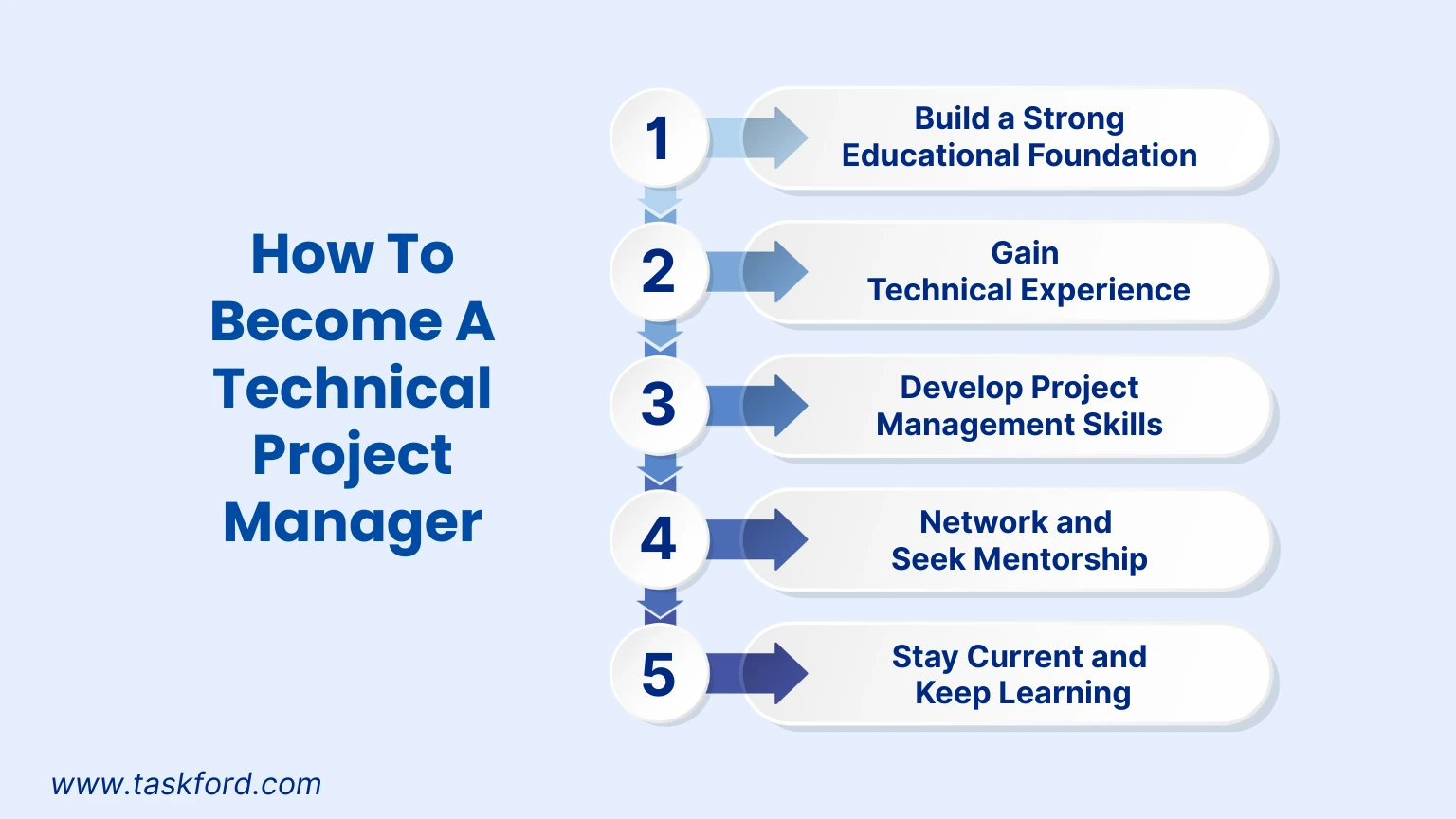
1. Build a Strong Educational Foundation
A solid academic background provides the technical knowledge needed for the role.
- Relevant Degree: A bachelor’s degree in computer science, engineering, information technology, or a related field is often required. These programs teach critical concepts like programming, system design, or database management.
- Advanced Education: While not mandatory, a master’s degree in computer science or an MBA with a technology focus can boost credibility, especially for senior roles.
For example, a computer science degree might teach you Python or Java, which helps you understand the technical challenges your team faces in a software project.
2. Gain Technical Experience
Hands-on experience in technical roles builds the expertise needed to guide teams and make informed decisions.
- Entry-Level Technical Roles: Start as a software developer, systems analyst, or network engineer to learn technologies like coding, cloud platforms (e.g., AWS), or IT infrastructure.
- Project Involvement: Work on tech projects to understand real-world challenges, such as debugging code or integrating APIs, which prepares you for oversight roles.
For instance, spending a few years as a developer on a web application project can help you later manage similar projects by anticipating issues like scalability.
3. Develop Project Management Skills
Transitioning to a project management role requires learning how to plan, lead, and deliver projects effectively.
- Learn Methodologies: Study project management frameworks like Agile, Scrum, or Waterfall, which are widely used in tech projects. Agile, for example, is common in software development for its flexibility.
- Certifications: Earn credentials like PMP (Project Management Professional), CAPM (Certified Associate in Project Management), or Certified ScrumMaster to demonstrate expertise. These certifications teach skills like risk management and stakeholder communication.
Taking a Scrum Master course, for example, can prepare you to lead Agile sprints in a software development project.
4. Network and Seek Mentorship
Building professional relationships and learning from experienced project managers can accelerate your career.
- Join Professional Groups: Engage with communities like the Project Management Institute (PMI) or tech-focused meetups to connect with industry professionals.
- Find a Mentor: A seasoned technical project manager can offer guidance on navigating challenges, such as balancing technical and leadership duties.
Attending a PMI conference, for instance, might connect you with a mentor who shares insights on managing complex IT projects.
5. Stay Current and Keep Learning
Technology evolves rapidly, and staying updated is critical to remain effective in this role.
- Continuous Learning: Take online courses on platforms like Coursera or Udemy to learn new tools, such as cloud computing or DevOps practices.
- Industry Trends: Follow tech blogs, attend webinars, or read journals to stay informed about advancements like artificial intelligence or cybersecurity.
For example, learning about new AWS services can help you manage a cloud migration project more effectively.
By combining education, technical experience, project management training, networking, and ongoing learning, you can build a successful career as a technical project manager. This path requires dedication but offers the chance to lead innovative tech projects and make a significant impact.
Conclusion
Technical project managers are the backbone of successful tech projects. They combine technical expertise with leadership to guide teams, manage risks, and deliver results. Whether it’s building software, upgrading IT systems, or launching data solutions, their role ensures projects meet both technical and business goals. Tools like TaskFord make their work easier by providing clear task management, collaboration, and planning features.
For companies tackling complex tech projects, a skilled technical project manager is a game-changer. If you’re interested in this career or need one for your team, understanding their role is the first step to achieving project success.
Learn more
- What Does A Project Manager Do? A Guide to Advancing Your Career
- What is Project Management: A Beginner’s Comprehensive Guide 2025
- A Day in the Life of a Project Manager: How They Bring Projects to Life
Making work simpler,
smarter, and more connected
Join our waitlist and be notified first.

Related Blog
Subscribe for Expert Tips
Unlock expert insights and stay ahead with TaskFord. Sign up now to receive valuable tips, strategies, and updates directly in your inbox.


